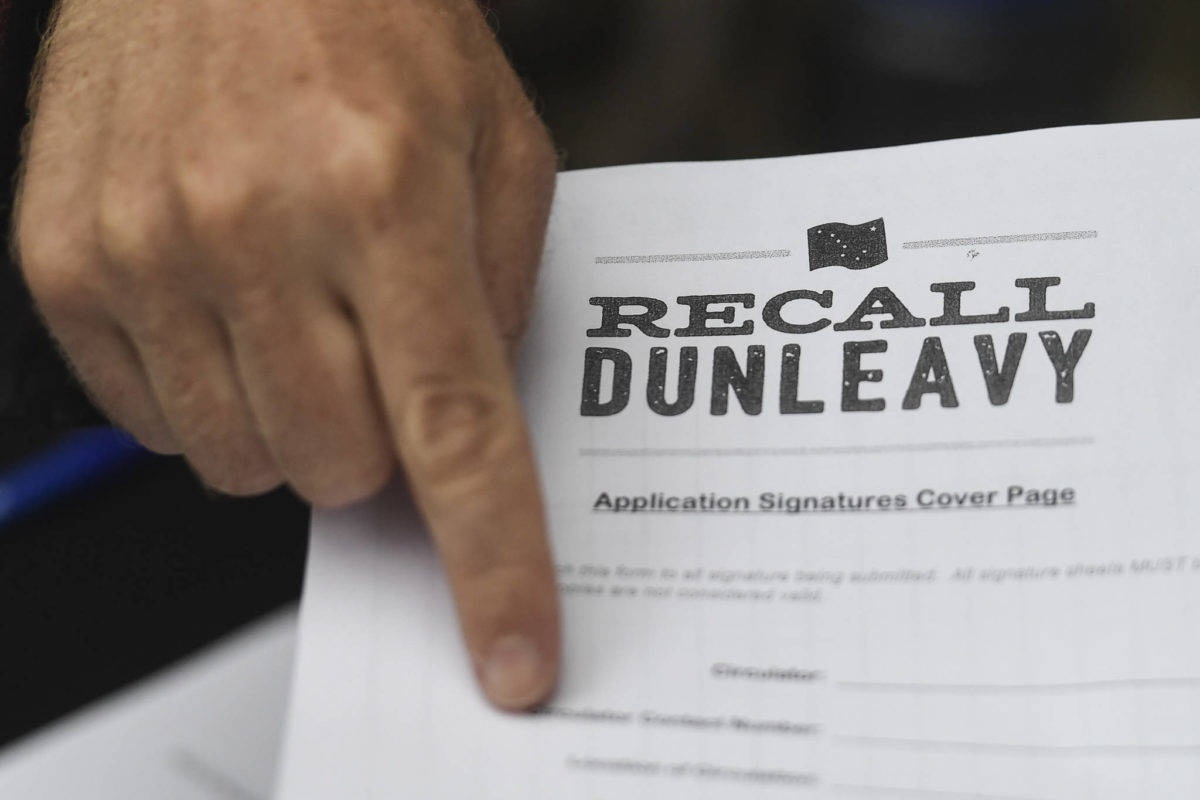The Alaska Supreme Court affirmed an Anchorage Superior Court decision, ruling that the Recall Dunleavy campaign’s application satisfied the legal requirements to be sent to voters, prompting a strong rebuke from Gov. Mike Dunleavy.
The recall campaign’s application alleged four complaints against Dunleavy, all of which were found “legally sufficient,” by the court.
One of the complaints stated he violated the separation of powers when using the governor’s power to line-item veto budget items, specifically when he vetoed items in the judiciary budget. The court’s ruling said that while a governor does have the power to veto, that power must remain within constitutional bounds and that underfunding of one branch by another could be constituted as a violation of the separation of powers.
“In short, the separation of powers doctrine is intended in part to ensure that the judiciary is not pressured to decide cases with one eye on its budget,” the court said in an opinion shared Friday. “We conclude that the doctrine may be violated by a governor’s use of the veto power with the intent of pressuring the courts to rule in a particular way.”
The other complaints stated Dunleavy misused state funds for partisan purposes, violated Alaska law by refusing to appoint a superior court judge within the allotted time and acted incompetently by mistakenly vetoing $18 million more than stated in official communications.
The campaign’s application was initially rejected by former Attorney General Kevin Clarkson who called the claims factually and legally insufficient, touching off a lawsuit between the recall campaign and the state.
The ruling prompted a strong reaction from Gov. Mike Dunleavy who issued a statement Friday saying the Court’s decision undermined the Alaska Constitution and violates the separation of powers.
“The Alaska Supreme Court today issued an opinion that creates a standardless recall process, subjecting elected officials at every level, and across the political spectrum, to baseless, expensive, and distracting recall elections by their political opponents,” Dunleavy said.
The Court voted 4-1 in favor of the recall campaign and in his statement, Dunleavy cited the lone dissenting opinion of Justice Craig Stowers.
“The court unconstitutionally aggrandizes its own power and imperils the independence of another branch of government,” Stowers wrote. “The court’s decision undermines Alaska’s constitution and the separation of powers.”
Dunleavy said in his statement the decision underscores the need for Alaska to change the way it selects its judges.
“I have long argued that the Alaska Supreme Court — and the people of this state — would benefit if the Alaska Judicial Council would nominate a slate of candidates with more balanced and diverse judicial philosophy,” Dunleavy said.
Scott Kendall, one of the lawyers for the Recall Dunleavy campaign who argued the case, told the Empire Friday the decision did take an expansive view of a governor’s use of veto power and the ruling would likely raise other legal questions.
“The court took a pretty strong and expansive view that says you can’t veto across branches (of government),” Kendall said. “That’s a broad, relatively new holding. It obviously and clearly has implications for the governor’s unprecedented veto of legislative per diem.”
Dunleavy said at a July 1 news conference he vetoed lawmakers per diem for the summer’s special sessions because the Legislature had failed to produce a complete budget. Lawmakers were only able to approve funding for part of the state’s budget and will meet again for yet another special session with hopes of reaching the three-quarters of the Legislature necessary to access the state’s Constitutional Budget Reserve.
Stowers’ concerns were reasonably articulated, Kendall said, but noted it focused solely on the court’s ruling with regard to the veto power and made no objections to other charges made in the recall application.
The Recall Campaign started in 2019 in response to deep cuts to the state budget by Dunleavy, particularly the over $400 million in line-item vetoes, but as of July hadn’t yet collected enough signatures to get a recall vote on the next statewide election.
Kendall said he found it troubling the governor’s reaction to the ruling was to call for a change to the judicial appointment system but said he felt the recall campaign had been in some ways successful.
“He abandoned all of it,” Kendall said, referring to the deep cuts previously pursued by the Dunleavy administration. “In some sense, that version of Dunleavy was recalled. We’ve seen a different tone from the governor in recently.”
Contact reporter Peter Segall at psegall@juneauempire.com. Follow him on Twitter at @SegallJnuEmpire.


